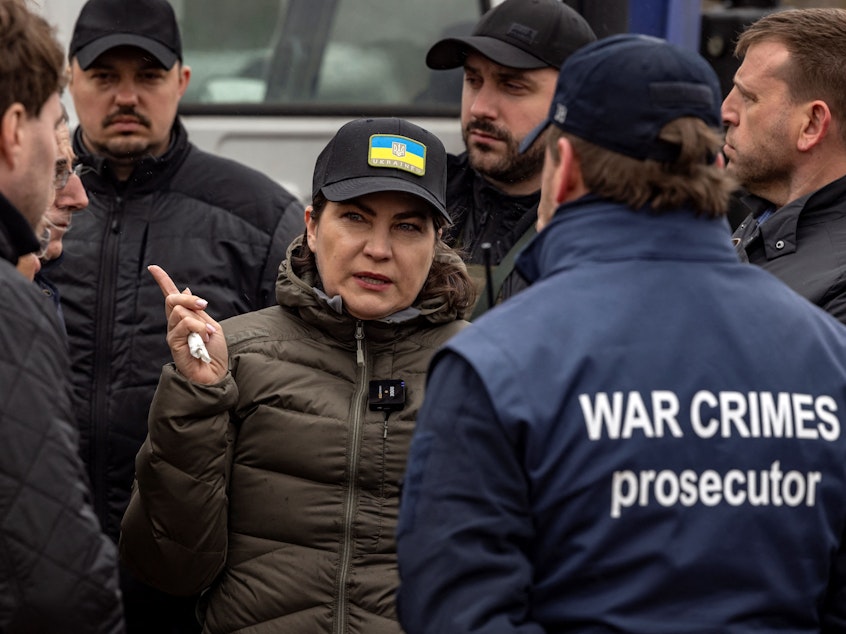As Ukraine investigates Russian war crimes, the U.S. and EU allies offer assistance

As Ukraine investigates possible Russian war crimes following Moscow's full-scale invasion seven weeks ago, the United States is stepping forward to assist.
The U.S. departments of State and Justice are working with European allies to support Ukraine's prosecutor general, who is investigating on the ground.
"It's extremely important for the sanctity and integrity of history to document these crimes, to make sure that we have preserved and authenticated the evidence that is being generated in the various crime scenes around Ukraine," said Beth Van Schaack, the U.S. ambassador-at-large for global criminal justice.
It's also important, Van Schaack told NPR in an interview, "for the sake of victims and survivors so that they know that the international community has seen what the have experienced, has called it for what it is, has ratified their very legitimate demands for justice."
The American support for Ukraine's investigative efforts comes in different forms. U.S. officials met this month with European counterparts to work out a plan for gathering evidence on Ukraine.
Sponsored
At the same time, Van Schaack said, the State Department is funding a group of outside experts with experience prosecuting war crimes who are directly assisting Ukrainian authorities.
One of the leaders of the group is Clint Williamson, a former U.S. ambassador-at-large for war crimes issues.
Before the war began, his group was helping Ukraine investigate possible war crimes following Russia's takeover of Crimea and Donbas in 2014. After Moscow invaded in February, his team pivoted to focus on what could be taking place now.
The Ukrainian authorities, he said, have experience investigating war crimes, but not "on a large scale and certainly in the midst of a full-blown armed conflict."
"You're potentially looking at command responsibility cases that can go up to senior political and military leaders, so this becomes just a much more complex investigative and prosecutorial approach," he said.
Sponsored
The U.S. and European allies are trying to help bridge that gap by providing expertise, advice and support. Williamson's group, for example, is pulling together war crimes prosecutors, investigators, analysts, forensic experts — all with extensive experience with war crimes cases — to help Ukraine.
There are also so-called mobile justice teams of international experts to support Ukrainian investigators and prosecutors on the ground.
Linking crimes up the chain of the command
The more straightforward aspect of a war crimes investigation is similar to a garden variety criminal investigation: What happened? When did it happen? Who are the victims?
The more challenging aspect is often referred to as "linkage evidence," which links the crimes up the chain of command. That involves, for example, determining which military unit was in a given place at a given time, who was the commander at various levels all the way up to the more senior military and political leadership, depending on the scale and nature of the crimes.
Sponsored
This is where the outside experts, and their experience with more complex cases, can help Ukrainian authorities.
All of these efforts to document possible Russian crimes now is with an eye toward holding perpetrators accountable in the future.
It's unclear at this point what the venue for any possible war crimes trial would be, although Van Schaack said there were several options, including the International Criminal Court, which has opened its own investigation into possible war crimes in Ukraine. The United States is not party to the court, so that could complicate things from the American side, although the Biden administration has welcomed the ICC's decision.
Domestic courts are another option, and Ukraine's courts clearly would have jurisdiction while courts in European countries whose laws allow national authorities to prosecute international crimes might also provide venues.
The end result may be a blend of international and domestic, Van Schaack said.
Sponsored
The Nuremberg Tribunal set up by the victorious allies after World War II handled defendants whose crimes had no geographic location, while local courts and military commissions handled individuals whose crimes were more localized.
"So you could imagine an arrangement like that where the ICC takes the bigger fish and local courts within Ukraine deal with crimes committed within their more local jurisdiction," she said. [Copyright 2022 NPR]



